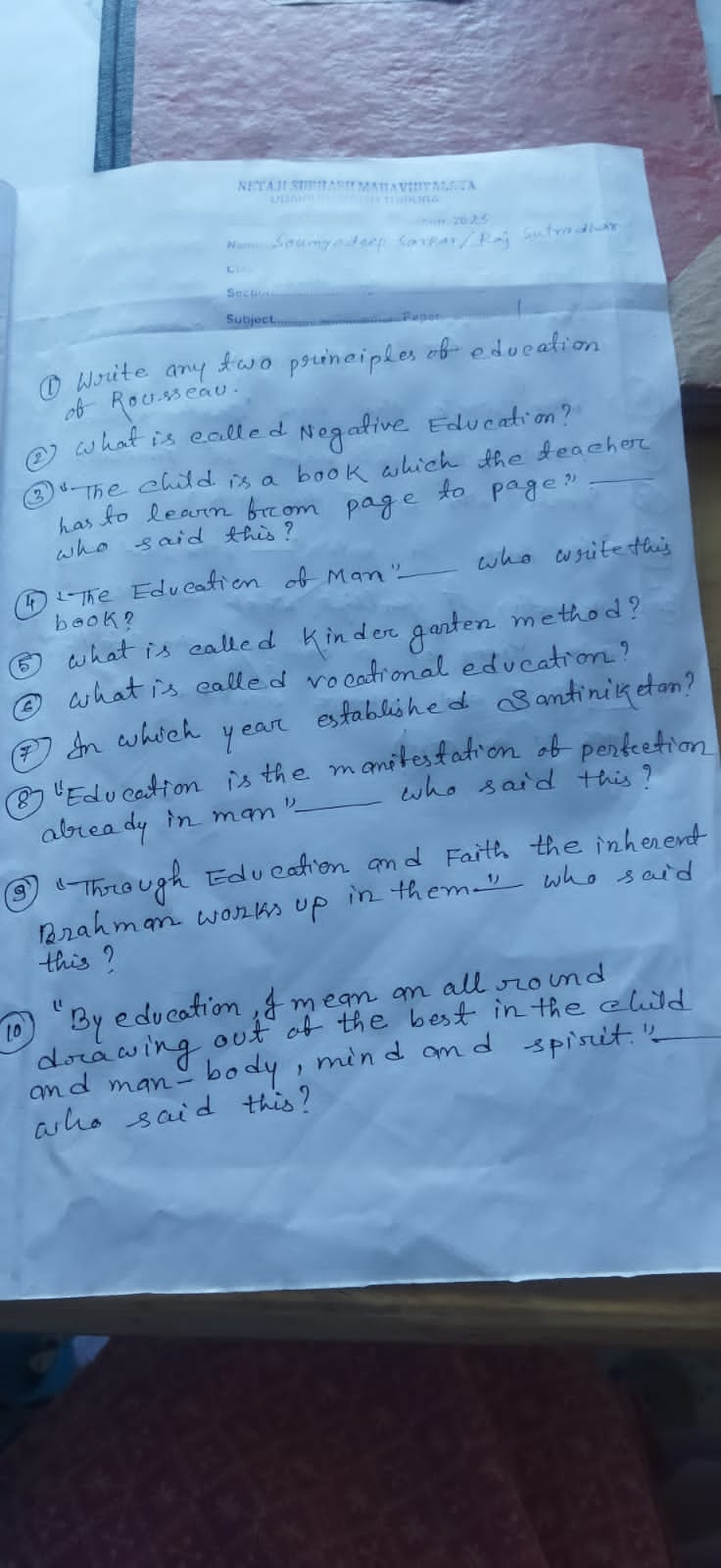1. Write any two principles of education of Rousseau. 2. What is called Negative Education? 3. 'The child is a book which the teacher has to learn from page to page.' Who said this... 1. Write any two principles of education of Rousseau. 2. What is called Negative Education? 3. 'The child is a book which the teacher has to learn from page to page.' Who said this? 4. 'The Education of Man.' Who wrote this book? 5. What is called Kindergarten method? 6. What is called vocational education? 7. In which year was Santiniketan established? 8. 'Education is the manifestation of perfection already in man.' Who said this? 9. 'Through Education and Faith, the inherent Brahman works up in them.' Who said this? 10. 'By education I mean an all-round drawing out of the best in the child and man - body, mind and spirit.' Who said this?

Understand the Problem
The question is asking for information related to educational theories and historical educational figures. It involves identifying principles, methods, and quotes associated with education.
Answer
1. Naturalism, negative education. 2. Non-interference in learning. 3. Rabindranath Tagore. 4. Friedrich Froebel. 5. Play-based learning. 6. Skills-focused training. 7. 1901. 8. Swami Vivekananda. 9. Sri Aurobindo. 10. Mahatma Gandhi.
- Two principles of Rousseau's education include 'naturalism' and 'negative education.' 2. Negative education is an approach that focuses on non-interference and learning from nature. 3. 'The child is a book...' was said by Rabindranath Tagore. 4. 'The Education of Man' was written by Friedrich Froebel. 5. The Kindergarten method, introduced by Froebel, emphasizes play and activity-based learning for young children. 6. Vocational education focuses on practical skills for specific trades. 7. Santiniketan was established in 1901. 8. 'Education is the manifestation of perfection already in man' was said by Swami Vivekananda. 9. 'Through Education and Faith...' was said by Sri Aurobindo. 10. 'By education I mean an all-round drawing out...' was said by Mahatma Gandhi.
Answer for screen readers
- Two principles of Rousseau's education include 'naturalism' and 'negative education.' 2. Negative education is an approach that focuses on non-interference and learning from nature. 3. 'The child is a book...' was said by Rabindranath Tagore. 4. 'The Education of Man' was written by Friedrich Froebel. 5. The Kindergarten method, introduced by Froebel, emphasizes play and activity-based learning for young children. 6. Vocational education focuses on practical skills for specific trades. 7. Santiniketan was established in 1901. 8. 'Education is the manifestation of perfection already in man' was said by Swami Vivekananda. 9. 'Through Education and Faith...' was said by Sri Aurobindo. 10. 'By education I mean an all-round drawing out...' was said by Mahatma Gandhi.
More Information
Rousseau emphasized education aligning with a child’s nature and freedom, while the Kindergarten method revolutionized early learning with structured play.
Tips
In understanding Rousseau, avoid assuming traditional teaching methods apply. His philosophy centers on nature and the child's inherent capabilities.
Sources
- Educational Philosophy of Rousseau - onlinenotebank.wordpress.com
- The principle 'first education should be purely negative' - testbook.com
AI-generated content may contain errors. Please verify critical information